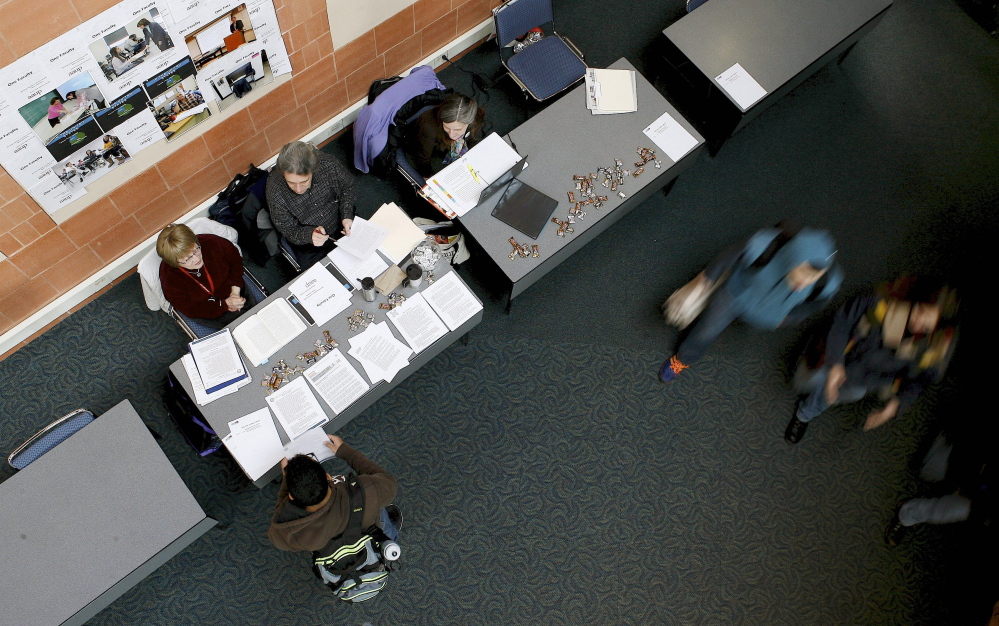NEW BRITAIN, Conn. — It’s not unusual to see a professor grading a stack of papers, but doing so in the middle of the Central Connecticut State University Student Center is a bit out of the ordinary.
Yet, for four hours Feb. 25, that’s exactly what happened, as CCSU’s adjunct professors staged a “grade-in” to raise awareness of the work the part-time instructors do and the conditions in which they are asked to perform.
The “grade-in” coincided with National Adjunct Walkout Day – a countrywide protest to highlight adjuncts’ low wages and poor working conditions, despite the fact they make up the majority of college professors.
“The idea behind this is to bring some attention to the part-time faculty,” Kevin Kean, a lecturer in psychological science, said. Kean has served as an adjunct for more than 10 years. He said Central’s adjuncts chose not to walk out of their classrooms, primarily because they felt it would be unfair to their students. Instead they chose to hold the “grade-in” as a way to showcase some of the work they do day in and day out without compensation.
Being part-time employees, adjunct professors are paid only for teaching classes.
Although Kean, as well as fellow CCSU adjuncts Laura Jensen, Mary Jo Lynch and Kim Dorfman, said they’re more fortunate than many adjuncts around the country as they have the support of a union – the CSU-AAUP – most part-time instructors at other institutions have little or no access to office space, computers, phones, voicemail and support services.
Adjuncts, according to Kean, often share small offices with other professors, or more likely, carry their offices with them, packing term papers and class plans in bags, preparing the curriculum at home, at Starbucks or, in Lynch’s case, at her daughter’s gymnastics practice.
Jensen said this causes a student privacy issue. All four said they have to set up office time in various places – maybe Dunkin’ Donuts, maybe the library, or maybe just a chat with their students while they walk to their next class. But, despite the uncertainty, they have to do what they have to do, or risk losing their jobs.
Adjunct professors are not guaranteed a position from semester to semester.
“We love our students; that’s why we do this. But it’s an effort,” Lynch, an adjunct for five years, said. “I can’t take a semester off because I know there are 25 others behind me.”
At Central, 53 percent of the instructional faculty is part-time. Seventy-one percent in the Connecticut State College and University System – Central, Western, Eastern and Southern Connecticut State universities and the community colleges – is adjunct.
In the U.S. as a whole, 57.2 percent is part-time; if graduate students are included, the figure rises to 76.4 percent, according the American Association of University Professors.
CCSU spokesman Mark McLaughlin said Central “is grateful for the service of our adjunct faculty. We value the quality of the education they provide our students.”
He added that university President Jack Miller and Provost Carl Lovitt meet regularly with the university’s faculty union to discuss, among other matters, how the university can provide a more supportive environment for adjunct faculty. He said that the school welcomes these conversations and is mindful that, in the end, they benefit its students.
An adjunct professor, according to the CCSU communications office, is contractually hired to teach one or more classes. When a full-time position becomes available, all qualified parties can apply.
Yet, across the nation, adjunct professors rallied Wednesday behind the message that they do much of the same work as those who are tenured without equal treatment.
The idea behind the walkout was spearheaded by a part-time professor at San Jose State University in California.
“We have to make people aware of what’s going on and bring attention to what the part-time faculty does,” CCSU’s Kean said. “Have you ever seen such a highly educated group of people have to function like this? Certainly not in the United States that I can think of.”
Send questions/comments to the editors.



Success. Please wait for the page to reload. If the page does not reload within 5 seconds, please refresh the page.
Enter your email and password to access comments.
Hi, to comment on stories you must . This profile is in addition to your subscription and website login.
Already have a commenting profile? .
Invalid username/password.
Please check your email to confirm and complete your registration.
Only subscribers are eligible to post comments. Please subscribe or login first for digital access. Here’s why.
Use the form below to reset your password. When you've submitted your account email, we will send an email with a reset code.